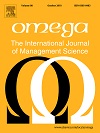Research productivity in management schools of India during 1968-2015: A directional benefit-of-doubt model analysis

Given the growing emphasis on research productivity in management schools of India over the years, the present authors developed a composite indicator (CI) of research productivity, using the directional- benefit-of-doubt (directional-BOD) model. Specifically, we examined overall research productivity of the schools and their respective faculty members during the 1968-69–2014-15 and 2004-05–2014-15 periods. There are four key findings. First, the relative weights of the journal tier, total citations, author h-index, number of papers, impact factor, and journal h-index varied from high to low in order for estimating the CI of a faculty member. Second, both public and private schools were seemingly similar in research productivity. However, faculty members at the Indian Institutes of Technology (IITs) outperformed those at the Indian Institutes of Management (IIMs). Third, faculty members who had their doctoral degrees from foreign schools were more productive than those who had similar degrees from Indian schools. Among those trained in India, however, alumni of IITs were more productive than those of IIMs. Finally, IIMs at Ahmedabad and Bangalore and the Indian School of Business, Hyderabad have more names than other schools among the list of top 5% researchers during 2004-05–2014-15. These findings indicate a shift in the priority from mere training of managers to generating impactful knowledge by at least two of the three established public schools, and call further attention to improving the quality of doctoral training in India in general and IIMs in particular. Five suggestions for improving research productivity are offered.
Research productivity in management schools of India during 1968-2015: A directional benefit-of-doubt model analysis

Given the growing emphasis on research productivity in management schools of India over the years, the present authors developed a composite indicator (CI) of research productivity, using the directional- benefit-of-doubt (directional-BOD) model. Specifically, we examined overall research productivity of the schools and their respective faculty members during the 1968-69–2014-15 and 2004-05–2014-15 periods. There are four key findings. First, the relative weights of the journal tier, total citations, author h-index, number of papers, impact factor, and journal h-index varied from high to low in order for estimating the CI of a faculty member. Second, both public and private schools were seemingly similar in research productivity. However, faculty members at the Indian Institutes of Technology (IITs) outperformed those at the Indian Institutes of Management (IIMs). Third, faculty members who had their doctoral degrees from foreign schools were more productive than those who had similar degrees from Indian schools. Among those trained in India, however, alumni of IITs were more productive than those of IIMs. Finally, IIMs at Ahmedabad and Bangalore and the Indian School of Business, Hyderabad have more names than other schools among the list of top 5% researchers during 2004-05–2014-15. These findings indicate a shift in the priority from mere training of managers to generating impactful knowledge by at least two of the three established public schools, and call further attention to improving the quality of doctoral training in India in general and IIMs in particular. Five suggestions for improving research productivity are offered.
